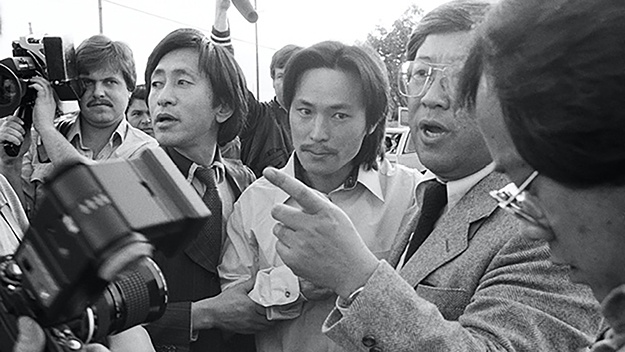Film Comment Recommends: Free Chol Soo Lee
This article appeared in the June 23, 2022 edition of The Film Comment Letter, our free weekly newsletter featuring original film criticism and writing. Sign up for the Letter here.

Free Chol Soo Lee (Julie Ha and Eugene Yi, 2022)
On June 3, 1973, Yip Yee Tak—a member of the Wah Ching gang—was shot to death on a crowded street corner in San Francisco’s Chinatown. When confronted with photographs of potential suspects, three white witnesses identified Chol Soo Lee as the perpetrator. A Korean immigrant with a juvenile record, Lee had just been reported for accidentally discharging a gun that seemed to match the caliber of the murder weapon. Scant evidence and tenuous identification led to Lee’s arrest and eventual life sentence for first-degree murder in 1974.
During Lee’s years in prison (eight of which he served on death row), Asian Americans across the Bay Area started a grassroots movement dedicated to freeing him. Local benefits raised money for Lee’s legal expenses through the Free Chol Soo Lee Defense Committee, whose efforts ultimately led to Lee’s retrial, acquittal, and release in 1983. But reentry into society proved difficult for Lee: he became addicted to drugs and involved in gang activity, straining the relationship between himself and his supporters. He died in 2014 at the age of 62, and his complex legacy has since receded into relative obscurity.
Julie Ha and Eugene Yi’s documentary Free Chol Soo Lee imparts “The Ballad of Chol Soo Lee,” to borrow the title of Jeff Adachi’s 1978 folk song about the case. Save for an animated sequence depicting Lee in prison, Ha and Yi’s directorial debut adheres to a conventional structure, switching between newspaper clippings, photographs, archival footage, and interviews with key members of the “Free Chol Soo Lee” movement. Interspersed throughout is the voiceover of Sebastian Yoon, a formerly incarcerated Korean-American activist, who reads from Lee’s prison memoirs.
Though told plainly, the film raises necessary questions about the prison-industrial complex and the model-minority myth, tracing how, once Lee became a poster child for the Asian-American fight against racism, support for his cause swelled into something both vast and conditional. In a television clip, Lee’s mother declares her son’s innocence and insists that she would not defend him if he were guilty. Interviewees praise Lee’s good looks, neat penmanship, and leadership skills, invoking the density of the expectations placed upon him as the symbol for a cause. Former members of his defense committee recall that after Lee was released from prison, they refused to lend him money, instead urging him to work hard and earn it himself. Already afraid to disappoint the community, Lee was alienated by what one activist describes as the pressure to “live the square life.”
Free Chol Soo Lee contrasts words about Lee with words by Lee to underline the carceral logic behind the expectation that he be an upstanding citizen. Their film suggests the need for intra-community introspection about the Asian-American dream: what forms of oppression it reifies, and whom it excludes. In a journal entry from prison, Lee writes that though he and many others on death row contemplated suicide, he “never burdened people on the outside with such dark thoughts.” Though Free Chol Soo Lee does not prescribe grand solutions, it points to the expulsion of shame as a starting point for solidarity and an integral element of real freedom.
Free Chol Soo Lee screens at BAMCinemafest on June 28.
Kelley Dong is a Toronto-based writer, producer, and filmmaker.







